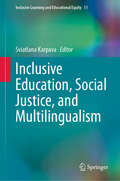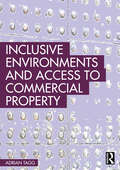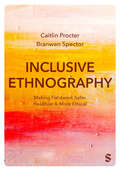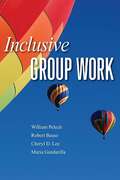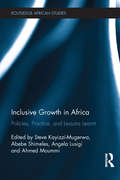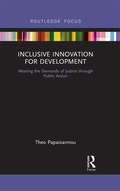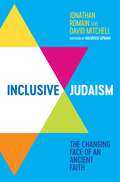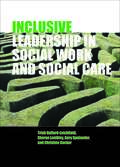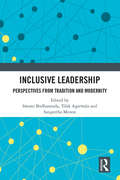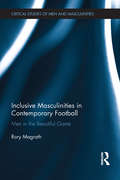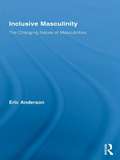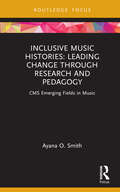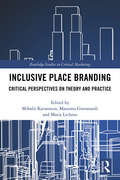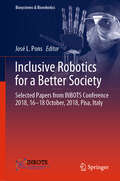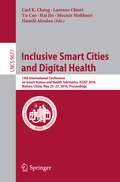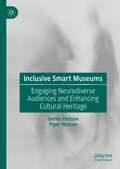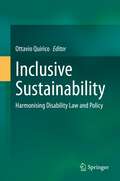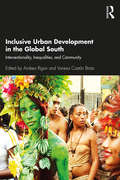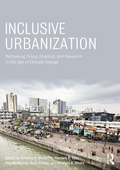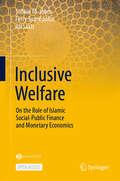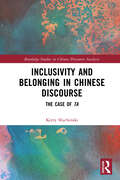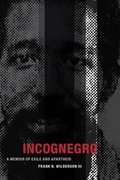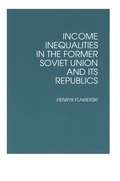- Table View
- List View
Inclusive Education, Social Justice, and Multilingualism (Inclusive Learning and Educational Equity #11)
by Sviatlana KarpavaThis edited volume delves into the intricate relationships between multilingualism, inclusive education, and social justice. It presents a rich array of interdisciplinary studies that blend both theoretical and practical perspectives. The authors employ a mixed-methods approach to gather and analyze data from a diverse range of populations, including students, teachers, parents, and language policy experts across various educational levels. The book examines the dynamics of bilingual and multilingual classrooms, as well as Content and Language Integrated Learning (CLIL) environments, emphasizing the importance of linguistic and cultural diversity as valuable educational resources. It draws upon a variety of theoretical and practical approaches from applied linguistics, sociolinguistics, language policy, and education, all centered on the benefits of multilingualism, inclusive education, and social justice. The work explores the complexities of multilingualism and multiculturalism and their connections to inclusive education and social justice across different geographic regions and educational settings. It adopts a dual approach, examining both theoretical frameworks and practical realities, by incorporating the voices and perspectives of multiple stakeholders. This diverse range of viewpoints sheds light on the roles of family and school involvement in promoting multilingual education, inclusive practices, and social justice.
Inclusive Environments and Access to Commercial Property
by Adrian TaggThis book presents and examines the challenges and compromises required to deliver inclusivity in the existing commercial-built environment and the socio-economic benefits that could result from successfully delivering it.To illuminate the advantages of an inclusive environment to property owners, investors and service providers, the book covers the history of disability and evolution of the legislation and examines the demographics and types of disability to question the ‘one size’ ‘blanket’ approach that currently exists to providing access. Delving further into the characteristics of the commercial property sectors and individual disability-specific requirements, experienced commercial building surveyor, Adrian Tagg, analyses the contradictions in the existing legislation to establish examples of design compromise or reasonable adjustments. He seeks to contextualise public and commercial attitudes to disability and go further to demystify the term ‘reasonable adjustment’, which is used currently as a tool of compromise in providing access. The aim is to assess disability-specific requirements for access, as well as adopt a simplistic approach to developing access solutions to the existing built environment from a consultancy and user perspective.Ultimately, this publication hopes to promote accessibility and inclusion from the perspective of surveyors, investors and landlords working in commercial property. It is not just targeted at those on undergraduate or post-graduate surveying courses, as well as those early career professionals undertaking their APC or post-graduate qualifications, but also at those owning or delivering goods, services and employment from commercial premises who want to make a difference.
Inclusive Ethnography: Making Fieldwork Safer, Healthier and More Ethical
by Caitlin Procter Branwen SpectorHow can you do ethnographic field research in a safe way for you and the people you work with? In this nuanced, candid book, researchers from across the globe discuss core challenges faced by ethnographers, reflecting on research from preparation to dissemination and how identity interacts with the realities of doing fieldwork. Building on the work of the editors’ The New Ethnographer Project, which has been seeking to change the way ethnographic methods are approached and taught since 2018, the book: Promotes an inclusive approach that invites you to learn from the challenges faced by a diverse range of scholars. Addresses underexplored issues including emotional and physical safety in the face of ableism, homophobia and racism. Challenges assumptions of what it means to produce knowledge by conducting fieldwork. Whether you’re an undergraduate student or an experienced researcher, this book will help you do fieldwork that is safer, healthier and more ethical.
Inclusive Ethnography: Making Fieldwork Safer, Healthier and More Ethical
by Caitlin Procter Branwen SpectorHow can you do ethnographic field research in a safe way for you and the people you work with? In this nuanced, candid book, researchers from across the globe discuss core challenges faced by ethnographers, reflecting on research from preparation to dissemination and how identity interacts with the realities of doing fieldwork. Building on the work of the editors’ The New Ethnographer Project, which has been seeking to change the way ethnographic methods are approached and taught since 2018, the book: Promotes an inclusive approach that invites you to learn from the challenges faced by a diverse range of scholars. Addresses underexplored issues including emotional and physical safety in the face of ableism, homophobia and racism. Challenges assumptions of what it means to produce knowledge by conducting fieldwork. Whether you’re an undergraduate student or an experienced researcher, this book will help you do fieldwork that is safer, healthier and more ethical.
Inclusive Group Work
by William Pelech Robert Basso Cheryl Lee Maria GandarillaInclusive Group Work offers an innovative approach to working with intervention groups and task groups by redefining the concept of diversity and reframing core group work concepts. Appropriate for both undergraduate and graduate courses, this book introduces readers to the foundations of group practice with an emphasis on social justice. The book presents diversity as a relational concept that is at the heart of all group interactions. Individual identity is complex, and in order for all members to be treated equally their individuality must be accepted and respected. Using this framework, the book discusses the values and ethics of social work with groups, explores the stages of group work including planning, and presents both basic and advanced skills such as conflict resolution and the use of self. Theories are put into practice in three chapters of case studies that show in-detail how diversity can be employed as a strength in multiple settings to achieve the wide variety of goals groups pursue. Through this new approach, students and practitioners alike will learn how to harness diversity to engage and maintain participation in inclusive group processes.
Inclusive Growth in Africa: Policies, Practice, and Lessons Learnt (Routledge African Studies)
by Abebe Shimeles Steve Kayizzi-Mugerwa Angela Lusigi Ahmed MoummiInclusive Growth in Africa analyzes the concept of inclusion within the challenges facing Africa’s rapidly growing economies, where rising affluence for some has been accompanied almost everywhere with rising inequality. Using a combination of political economy analyses, sector studies and econometric models, the contributors delve into a range of areas associated to the new realities on the continent. Topics covered include issues of disability, corruption, capital flight, and their implications for economic sustainability. There is also a discussion of the impact on development of dependence on externally determined prices for Africa’s natural resources. Other sector analyses look at agriculture and wind power, and the innovations required to make a difference for the poorer majority. The book comprises of a rich array of essays on socio-economic inclusion in Africa by authors drawn from academia, African think tanks and international organizations. It would be of interest to scholars and students of many disciplines, including: Economics, Sociology, Development Studies, and African Studies.
Inclusive Innovation for Development: Meeting the Demands of Justice through Public Action (Routledge Studies in Development and Society)
by Theo PapaioannouInnovation has the potential to address a number of development challenges such as combating poverty and delivering health services, but all too often technological progress has failed to consider the needs of the poor, and has actually served to increase inequalities, rather than sharing out the benefits of new technologies and economic growth. Inclusive Innovation for Development outlines a theory of justice in innovation, arguing that principles of equity, recognition and participation can guide the direction of contemporary innovation systems towards equalising social relations in the production of knowledge and innovation, and meeting the basic needs of the poor. The book first explores why inclusivity in innovation matters, and how the justice framework can be used to support inclusive innovation. The book then goes on to outline a ‘needs-based’ approach to innovation and development and explains how its principles can be generated through public action. Finally, it asks how we can effectively evaluate inclusive innovation. Drawing on cases from Africa, Latin America and South Asia, this book theorises innovation and justice in political terms, arguing that inclusive innovation is not just a practical necessity but a moral obligation. This book's novel approach to innovation for development will be useful for upper-level students and scholars of development studies, politics, and innovation studies, as well as to local, national and international policy-makers and practitioners dealing with international development and inclusive innovation policies and programmes.
Inclusive Judaism: The Changing Face of an Ancient Faith
by David Mitchell Jonathan RomainOne of the best-kept religious secrets has been the revolution that has been quietly taking place within Judaism over the last two decades, as it has sought to grapple with contemporary issues. These include mixed-faith marriages, gay relationships, women's empowerment, declining numbers, atheism and being trans. It has involved a willingness to abandon biblical laws that conflict with modern values. Most ground-breaking of all, it has meant re-defining what it means to be Jewish in the 21st century.Inclusive Judaism not only uncovers this religion revolution, but presents a challenge to all people of faith on how best to marry tradition and modernity. The book also reflects the soul-searching that has prompted rabbis to chart a new course, both out of principle and as a practical way of rescuing British Jewry from possible collapse if it did not adapt to the new social trends that affect us all.
Inclusive Leadership in Social Work and Social Care
by Sharon Lambley Trish Hafford-LetchfieldSocial work and social care continue to face an unprecedented period of challenge and uncertainty, requiring the development of leadership capabilities at every level of the workforce as well as in the community. This critical and reflexive book looks closely at the pivotal but demanding role that leadership and management play in promoting social work and social care. It focuses particularly on the value that is potentially created when the human relationships between people delivering and people using public services are effective, and the conditions are present to nourish confidence, inspire self-esteem, unlock potential and erode inequality. Aimed at new, aspiring and experienced managers, and senior practitioners, it draws on a range of disciplines not typically found in social work and social care and encourages readers to broaden their examination of leadership in areas such as the design of organisations, the role of service users in leadership practice and the phenomena of dignity within the context of organisational culture and dignity.
Inclusive Leadership: Perspectiives from Tradition and Modernity
by Sangeetha Menon Swami Bodhananda Tilak AgerwalaThis book reflects on the models of leadership espoused by ancient Indic traditions, in particular the Advaita Vedanta tradition. Focusing primarily on the Rajarshi – ‘the philosopher king’ – the essays in this volume showcase how using these models in contemporary society could lead to the creation of self-aware and empathic leaders and an inclusive society. The book explores examples of the Brahmarshi, or the wise scholar; Rajarshi, or the wise ruler; and Devarshi, or the visionary, to bring together all the ideal virtues of inclusive leadership in the current cultural and political space. The essays in the volume adopt a critical sociological, philosophical and management lens to analyse Indic traditions and dharmic concepts. The volume uses concepts such as dharma, karma and, yoga along with organisational psychology, technology, and management, to arrive at the concept of transcendental leadership. It theorises new definitions of the Rajarshi ideal, which can be used towards public service, social transformation and self-discovery. The volume will be useful for scholars and academics interested in Indic philosophies of leadership and governance, sociology, and social and political inclusivity. It will also be useful for readers in public administration, business and management.
Inclusive Masculinities in Contemporary Football: Men in the Beautiful Game (Critical Studies of Men and Masculinities)
by Rory MagrathFootball has traditionally been an institution hostile toward sexual minorities. Boys and men in the sport have deployed high levels of homophobia for multiple reasons. However, the ground-breaking research within this book shows that intolerant attitudes toward gay men are increasingly being challenged. Based on unprecedented access to Premier League academies, Inclusive Masculinities in Contemporary Football: Men in the Beautiful Game explores these changing attitudes toward homophobia in football today. Revealing a range of masculine identities never before empirically measured at this level of football, this book discusses the implications for the complex and enclosed structures of professional sport, and extends our understanding of contemporary masculinity. It also offers fresh insights to the importance of "banter" in the development of relationships and identities. This culture of banter often plays a paradoxical role, both facilitating and disrupting friendships formed between male footballers. As the first title in the Routledge Critical Studies of Men and Masculinities Series, this book is fascinating reading for all students and scholars interested in football and the study of gender, sexuality and the sociology of sport.
Inclusive Masculinity: The Changing Nature of Masculinities (Routledge Research in Gender and Society)
by Eric AndersonDrawing on qualitative studies of teamsport athletes and fraternity members, this book describes the rapidly changing world of masculinities among men in both the United States and Great Britain. As cultural homophobia decreases, university-aged men are influenced to construct a softer version of masculinity – one that is not predicated in homophobia. Inclusive Masculinity shows that today's youth express decreased sexism, racism and masculine bullying. As Eric Anderson demonstrates, men who value inclusive masculinities are also shown to be more likely to bond in emotional relationships with other men and to embrace a variety of behaviors once coded as feminine, including certain same-sex sexual behaviors. Now available in paperback, this groundbreaking analysis of masculinity and young men will be of interest to students and faculty members within Sociology, Gender Studies, and Sport Studies.
Inclusive Music Histories: CMS Emerging Fields in Music (CMS Emerging Fields in Music)
by Ayana O. SmithInclusive Music Histories: Leading Change through Research and Pedagogy models effective practices for researchers and instructors striving either to reform music history curricula at large or update individual topics within their classes to be more inclusive. Confronting racial and other imbalances of Western music history, the author develops four core principles that enable a shift in thinking to create a truly intersectional music history narrative and provides case studies that can be directly applied in the classroom. The book addresses inclusivity issues in the discipline of musicology by outlining imbalances encoded into the canonic repertory, pedagogy, and historiography of the field. This book offers comprehensive teaching tools that instructors can use at all stages of course design, from syllabus writing and lecture planning to discussion techniques, with assignments for each of the subject matter case studies. Inclusive Music Histories enables instructors to go beyond token representation to a more nuanced music history pedagogy.
Inclusive Music Histories: CMS Emerging Fields in Music (CMS Emerging Fields in Music)
by Ayana O. SmithInclusive Music Histories: Leading Change through Research and Pedagogy models effective practices for researchers and instructors striving either to reform music history curricula at large or update individual topics within their classes to be more inclusive. Confronting racial and other imbalances of Western music history, the author develops four core principles that enable a shift in thinking to create a truly intersectional music history narrative and provides case studies that can be directly applied in the classroom. The book addresses inclusivity issues in the discipline of musicology by outlining imbalances encoded into the canonic repertory, pedagogy, and historiography of the field. This book offers comprehensive teaching tools that instructors can use at all stages of course design, from syllabus writing and lecture planning to discussion techniques, with assignments for each of the subject matter case studies. Inclusive Music Histories enables instructors to go beyond token representation to a more nuanced music history pedagogy.
Inclusive Place Branding: Critical Perspectives on Theory and Practice (Routledge Studies in Critical Marketing)
by Mihalis Karavatzis Massimo Giovanardi Maria LichrouPlace branding is often a response to inter-place competition and discussed as if it operated in a vacuum, ignoring the needs of local communities. It has developed a set of methods – catchy slogans, colourful logos, ‘star-chitects’, bidding for City of Culture status etc. – that are applied as quick-fix solutions regardless of geographical and socio-political contexts. Critical views of place branding are emerging which focus on its unexplored consequences on the physical and social fabric of places. These more critical approaches reveal place branding as an essentially political activity, serving hidden agendas and marginalizing social groups. Scholars and practitioners can no longer ignore the need for more responsible and socially sensitive approaches to cater for a wider range of stakeholders, and which fully acknowledge the importance of resident participation in decision-making. The contributions in this innovative book set out to introduce new critical ways of thinking around place branding and practices that encourage it to be more inclusive and participatory. It will be of interest to researchers and advanced students of branding, critical marketing, and destination marketing as well as critical tourism and environmental design.
Inclusive Robotics for a Better Society: Selected Papers from INBOTS Conference 2018, 16-18 October, 2018, Pisa, Italy (Biosystems & Biorobotics #25)
by José L. PonsThe book reports on advanced topics in interactive robotics research and practice; in particular, it addresses non-technical obstacles to the broadest uptake of these technologies. It focuses on new technologies that can physically and cognitively interact with humans, including neural interfaces, soft wearable robots, and sensor and actuator technologies; further, it discusses important regulatory challenges, including but not limited to business models, standardization, education and ethical–legal–socioeconomic issues. Gathering the outcomes of the 1st INBOTS Conference (INBOTS2018), held on October 16–20, 2018 in Pisa, Italy, the book addresses the needs of a broad audience of academics and professionals working in government and industry, as well as end users. In addition to providing readers with detailed information and a source of inspiration for new projects and collaborations, it discusses representative case studies highlighting practical challenges in the implementation of interactive robots in a number of fields, as well as solutions to improve communication between different stakeholders. By merging engineering, medical, ethical and political perspectives, the book offers a multidisciplinary, timely snapshot of interactive robotics.
Inclusive Smart Cities and Digital Health
by Yu Cao Mounir Mokhtari Hai Jin Carl K. Chang Lorenzo Chiari Hamdi AloulouThis book constitutes the proceedings of the 14th International Conference on Smart Homes and Health Telematics, ICOST 2016, held in Wuhan, China, in May 2016. The 39 regular papers, 5 short papers and 1 poster paper included in this volume were carefully reviewed and selected from 83 submissions. They were organized in topical sections named: smart homes, smart urban spaces and new assistive living space concepts in the smart city; e-health for future smart cities; context awareness and autonomous computing; home networks and residential gateways; middleware support for smart homes and health telematic services; e-health and chronic disease management; e-health technology assessment and impact analysis; tele-assistance and tele-rehabilitation; modeling of physical and conceptual information in intelligent environments; medical big data collection, processing and analysis; human machine interfaces; wearable sensors and continuous health monitoring; social, privacy and security issues; mobile health services; and smart rehabilitation technologies.
Inclusive Smart Museums: Engaging Neurodiverse Audiences and Enhancing Cultural Heritage
by James Hutson Piper HutsonThis book delves into the significant and timely intersection of cultural heritage, neurodiversity, and smart museums, exploring how various immersive techniques can create more inclusive and engaging heritage experiences for neurodiverse audiences. By focusing on these three aspects, the book aims to contribute significantly to the fields of cultural heritage, neuro-inclusivity, and smart museums, offering practical solutions and examples for heritage professionals and researchers. The book highlights the importance of preserving and enhancing cultural heritage by incorporating immersive technologies and inclusive practices that cater to the needs of neurodiverse audiences. It emphasizes the need for museums and heritage sites to be more inclusive and accessible for neurodivergent individuals, showcasing best practices and innovative techniques to engage this audience effectively.
Inclusive Sustainability: Harmonising Disability Law and Policy
by Ottavio QuiricoIn light of the third-generation concept of ‘inclusive sustainability’, the volume explores the architecture of global disability governance and its degree of harmonisation. The book integrates socio-cultural, economic, political and legal analyses from an international and comparative perspective. The first part of the volume outlines a tripartite systematisation of disability rights for States and non-state persons. In light of essential economic considerations, the second part explores the relationship between disability and specific fundamental rights and regimes, particularly the rights to life, health, education, work and participation. The third part takes an institutional approach and focuses on the way in which the UN and regional organisations regulate disability (rectius, different ability).
Inclusive Urban Development in the Global South: Intersectionality, Inequalities, and Community
by Andrea RigonInclusive Urban Development in the Global South emphasizes the importance of the neighbourhood in urban development planning, with case studies aimed at transforming current intervention practices towards more inclusive and just means of engagement with individuals and communities. The chapters explore how diversity of gender, class, race and ethnicity, citizenship status, age, ability, and sexuality is taken (or not taken) into account and approached in the planning and implementation of development policy and interventions in poor urban areas. The book employs a practical perspective on the deployment of theoretical critiques of intersectionality and diversity in development practice through case studies examining issues such as water and sanitation planning in Dhaka, indigenous rights to the city in Bolivia, post-colonial planning in Hong Kong, land reform in Zimbabwe, and many more. The book focuses on radical alternatives with the potential to foster urban transformations for planning and development communities working around the world.
Inclusive Urbanization: Rethinking Policy, Practice and Research in the Age of Climate Change
by Krishna K. Shrestha Hemant R. Ojha Phil McManus Anna Rubbo Krishna K. DhoteHow do we include and represent all people in cities? As the world rapidly urbanizes, and climate change creates global winners and losers, understanding how to design cities that provide for all their citizens is of the utmost importance. Inclusive Urbanization attempts to not only provide meaningful, practical guidance to urban designers, managers, and local actors, but also create a definition of inclusion that incorporates strategies bigger than the welfare state, and tactics that bring local actors and the state into meaningful dialogue. Written by a team of experienced academics, designers, and NGO professionals, Inclusive Urbanization shows how urbanization policy and management can be used to make more inclusive, climate resilient cities, through a series of 18 case studies in South Asia. By creating a model of urban life and processes that takes into account social, spatial, cultural, regulatory and economic dimensions, the book finds a way to make both the processes and outcomes of urban design representative of all of the city’s inhabitants.
Inclusive Welfare: On the Role of Islamic Social-Public Finance and Monetary Economics
by Solikin M. Juhro Ferry Syarifuddin Ali SaktiThis open access book serves to spur further development of Islamic economic and financial concepts and practices, particularly in terms of Islamic social-public finance and Islamic monetary policy support. The book has a number of objectives across different aspects. From an academic perspective, the book aims to foster frontier thinking and concepts that advance scientific ideas and teaching materials relating to the Islamic financial system, particularly the role of Islamic social-public finance and Islamic monetary economics. From a policy perspective, the book explores and develops discussions that support public policy innovation, thereby providing comprehensive understanding of policy theories and practices in the Islamic financial system. From a practical perspective, the book is expected to contribute by increasing knowledge and understanding concerning the application and scope of the Islamic economic system. This will confer various benefits to the readers.
Inclusivity and Belonging in Chinese Discourse: The Case of ta (Routledge Studies in Chinese Discourse Analysis)
by Kerry SluchinskiInclusivity and Belonging in Chinese Discourse explores how recent language change in the third-person pronoun system of Mandarin Chinese is harnessed by netizens to construct spaces of (non-)belonging along a fluid continuum in the context of pro- and anti-LGBTQ discourses.Grounded in stance, framing, and positioning theories, the monograph contributes to the notions of membership categorization and (co-)reference chains for identity construction. With a focus on newly emergent genderless third-person pronoun ta, written in pinyin, and the various noun and verb phrases which co-occur with the pronoun in specific contexts, this monograph shows how ta has become a conventionalized language practice accepted and implemented by language users of various identities, sexual orientations, and backgrounds for a vast array of interactional and communicative purposes. The monograph illustrates how ta is used in doing identity construction work for the self, another party involved in the interaction, and/or a third party external to the interaction, often simultaneously. That is, the specific function and referent of ta is defined through language users’ unique interpretations and the discourse community of use, resulting in a ‘chameleon-like’ pragmatically loaded pronoun which reflects the inherent fluidity of identity(ies).This monograph will appeal to scholars, language researchers, and advanced graduate students concerned with inclusive language use in the Chinese context, particularly within discourse analysis, linguistics, sociolinguistics, and semantics. The book will also be valuable to professionals concerned with inclusive language and identity construction.
Incognegro: A Memoir of Exile and Apartheid
by Frank B. Wilderson IIIIn 1995, a South African journalist informed Frank Wilderson, one of only two American members of the African National Congress (ANC), that President Nelson Mandela considered him "a threat to national security." Wilderson was asked to comment. Incognegro is that "comment." It is also his response to a question posed five years later in a California university classroom: "How come you came back?" Although Wilderson recollects his turbulent life as an expatriate during the furious last gasps of apartheid, Incognegro is at heart a quintessentially American story. During South Africa's transition, Wilderson taught at universities in Johannesburg and Soweto by day. By night, he helped the ANC coordinate clandestine propaganda, launch psychological warfare, and more. In this mesmerizing political memoir, Wilderson's lyrical prose flows from unspeakable dilemmas in the red dust and ruin of South Africa to his return to political battles raging quietly on US campuses and in his intimate life. Readers will find themselves suddenly overtaken by the subtle but resolute force of Wilderson's biting wit, rare vulnerability, and insistence on bearing witness to history no matter the cost.
Income Inequalities in the Former Soviet Union and Its Republics
by Henryk FlakierskiThis study analyses the newly available statistical evidence on income distribution in the former Soviet Union both by social group and by republic, and considers the significance of inequalities as a factor contributing to the demise of the Communist regime. Among the topics covered are wage distribution (interbranch and skill differentials and distribution in terms of gender, education, and age), income distribution for the former USSR as a whole, and wage and income distribution patterns for each republic, with analysis of regional differences.
